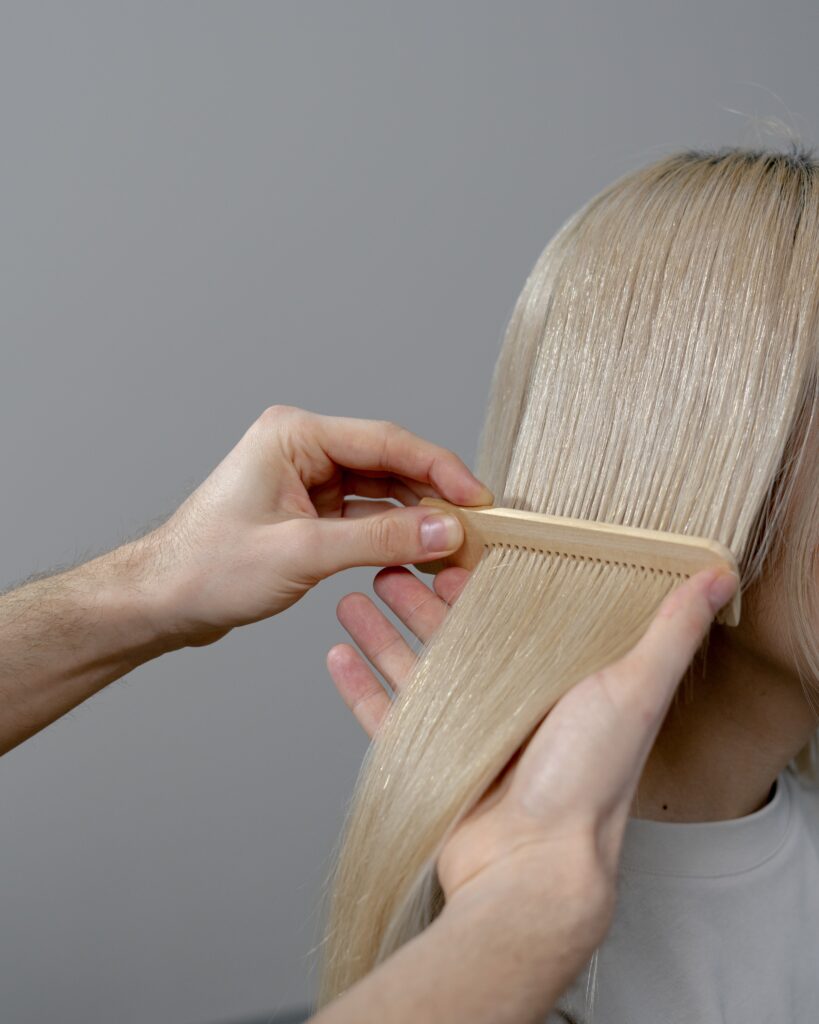A Comprehensive Guide to Hair Growth and Health

Introduction
Are you seekingways to improve your hair’s growth and health? Look no further! In this comprehensive guide, we’ll delve into the science of hair growth, explore the factors that affect hair health, and provide valuable tips for achieving luscious locks. We’ll also debunk common hair growth myths and help you determine when it’s time to consult a professional. Let’s get started!
The Science of Hair Growth
Hair Structure
Before we discuss hair growth, it’s essential to understand the basic structure of hair. Hair is composed of a protein called keratin and consists of three layers: the cuticle, cortex, and medulla. The cuticle is the outermost layer, which protects the hair shaft. The cortex lies beneath the cuticle and provides strength, colour, and elasticity. The medulla, the innermost layer, is only present in thicker hairs and has no known function.
Hair Growth Phases
Hair growth occurs in a cycle, consisting of three distinct phases: anagen, catagen, and telogen.
- Anagen: The active growth phase, during which hair follicles produce new hair shafts. This phase lasts between two to seven years.
- Catagen: A transitional phase that lasts about two weeks. During this time, hair growth stops, and the hair follicle shrinks.
- Telogen: The resting phase, lasting around three months. Hair is released from the follicle, and shedding occurs, making room for new hair growth.
Factors Affecting Hair Growth and Health
Genetics
Genetics play a significant role in determining hair growth rate, thickness, and colour. While you can’t change your genetic makeup, understanding your hair’s natural characteristics can help you tailor your hair care routine accordingly.
Hormones
Hormones like estrogen, testosterone, and thyroid hormones impact hair growth and health. Hormonal imbalances can lead to hair loss, thinning, or changes in texture.
Diet and Nutrition
A well-balanced diet rich in vitamins and minerals is essential for healthy hair growth. Key nutrients include biotin, vitamin D, iron, zinc, and protein.
Scalp Health
A healthy scalp provides the ideal environment for hair growth. Maintaining a clean scalp and addressing any underlying issues, such as dandruff or seborrheic dermatitis, is crucial for optimal hair health.
Environmental Factors
External factors like pollution, sun exposure, and harsh weather can damage hair and affect growth. Protecting your hair from these elements can help maintain its health and appearance.
Tips for Healthy Hair Growth
Proper Hair Care Routine
Establishing a consistent hair care routine is essential for hair health. This includes regular washing, conditioning, and trimming split ends.
Choosing the Right Hair Products
Select hair products that suit your hair type and address your specific concerns, such as dryness, frizz, or breakage. Avoid harsh chemicals and opt for gentle, natural ingredients whenever possible.
Balanced Diet and Supplementation
Ensure you consume a balanced diet with adequate vitamins and minerals to support hair growth. And natural supplement will help your hair health. Here is recommended natural supplement for your hair growth. Find out here
Regular Scalp Massages
Scalp massages can help stimulate blood flow to the hair follicles, promoting growth and overall scalp health.
Avoiding Heat and Chemical Damage
Minimise the use of heat-styling tools and harsh chemical treatments to prevent damage and breakage.
Common Hair Growth Myths Debunked
- Cutting your hair frequently makes it grow faster: Hair growth occurs at the follicle level, so trimming doesn’t affect the rate of growth. However, regular trims can help prevent split ends and breakage, leading to healthier-looking hair. 2. Shampooing daily causes hair loss: Over-washing can strip your hair of its natural oils, causing dryness and brittleness. However, it doesn’t directly cause hair loss. Adjust your washing frequency based on your hair type and needs.
- Hair growth can be increased with certain products: While some products may help create the illusion of thicker or fuller hair, no topical treatments can genuinely increase the rate of hair growth.
- Wearing hats causes hair loss: Hats do not cause hair loss unless they are extremely tight and cause constant tension on the hair follicles.
- Hair loss only affects men: Although men are more prone to hair loss, women can also experience it due to factors such as hormonal imbalances, stress, and certain medical conditions.
When to Consult a Professional
If you’re experiencing sudden or significant hair loss, changes in hair texture, or persistent scalp issues, it’s essential to consult a healthcare professional or dermatologist. They can help diagnose any underlying conditions and recommend appropriate treatments.
Best Supplements For Hair Growth and Health
A full head of healthy, lustrous hair is often seen as a symbol of youth, vitality, and confidence. However, factors such as ageing, genetics, hormonal imbalances, and poor nutrition can lead to hair loss, thinning, and slow growth. In response to these concerns, a variety of natural supplements have been developed to support and promote hair growth. This guide provides an introduction to the world of hair growth natural supplements, offering recommendations and insights to help you make informed choices in selecting the most suitable options for your individual needs. By understanding the underlying causes of hair-related issues and harnessing the power of nature’s bounty, you can embark on a journey towards achieving stronger, thicker, and healthier hair, ultimately boosting your self-esteem and overall well-being.
Conclusion
Understanding the science of hair growth and the factors that affect hair health is crucial for maintaining strong, healthy locks. By implementing a proper hair care routine, choosing the right products, maintaining a balanced diet, and addressing any underlying issues, you can promote healthy hair growth and enjoy luscious locks.



